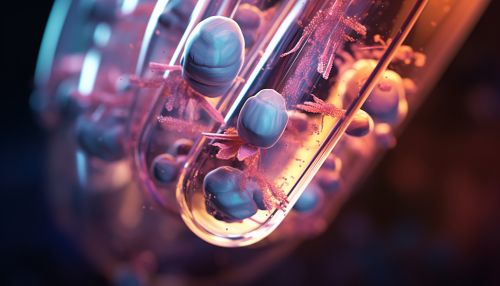Psychobiotics
Introduction
Psychobiotics are a class of probiotics that are believed to exert a positive influence on the mental health of the host. They are a type of probiotic that, when ingested in adequate amounts, can have a beneficial effect on the mind by altering the microbiota present in the gut. This concept is based on the gut-brain axis, which is a bidirectional communication system between the gastrointestinal tract and the nervous system.


History and Development
The term 'psychobiotics' was first coined in 2013 by Ted Dinan and John F. Cryan, researchers at the University College Cork, Ireland. They initially defined psychobiotics as probiotics that, when ingested in adequate amounts, produce a health benefit in patients suffering from psychiatric illness. However, the definition has since been expanded to include prebiotics and other substances that can influence the gut microbiota.
Mechanisms of Action
Psychobiotics exert their effects through various mechanisms, which include the production of neurotransmitters, modulation of the immune system, and alteration of the gut microbiota. Some psychobiotics can produce neurotransmitters such as serotonin and gamma-aminobutyric acid (GABA), which can affect mood and behavior. They can also modulate the immune system by reducing inflammation, which is often associated with mental health disorders. Furthermore, psychobiotics can alter the gut microbiota by increasing the abundance of beneficial bacteria and reducing the abundance of harmful bacteria.
Types of Psychobiotics
There are several types of psychobiotics, which include both probiotics and prebiotics. Probiotic psychobiotics are live microorganisms that can confer a health benefit when consumed in adequate amounts. They include various strains of bacteria such as Lactobacillus and Bifidobacterium. Prebiotic psychobiotics are substances that promote the growth of beneficial bacteria in the gut. They include dietary fibers and other non-digestible carbohydrates.
Potential Applications
Psychobiotics have potential applications in the treatment of various mental health disorders, including depression, anxiety, and stress-related disorders. They may also be beneficial in the treatment of neurodevelopmental disorders such as autism. However, more research is needed to fully understand the potential benefits and risks of psychobiotics.
Current Research and Future Directions
Current research on psychobiotics is focused on understanding their mechanisms of action, identifying effective strains and doses, and investigating their potential applications in mental health. Future directions for research include conducting clinical trials to evaluate the efficacy and safety of psychobiotics, investigating the potential for personalized psychobiotic therapies, and exploring the ethical and regulatory implications of psychobiotic use.
